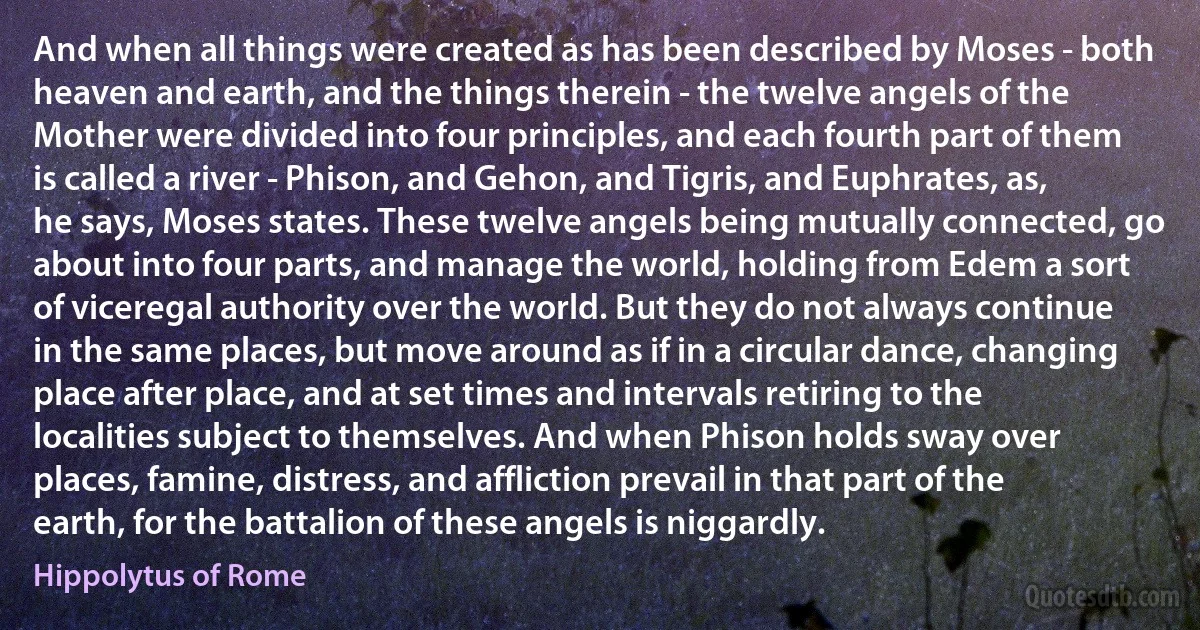
And when all things were created as has been described by Moses - both heaven and earth, and the things therein - the twelve angels of the Mother were divided into four principles, and each fourth part of them is called a river - Phison, and Gehon, and Tigris, and Euphrates, as, he says, Moses states. These twelve angels being mutually connected, go about into four parts, and manage the world, holding from Edem a sort of viceregal authority over the world. But they do not always continue in the same places, but move around as if in a circular dance, changing place after place, and at set times and intervals retiring to the localities subject to themselves. And when Phison holds sway over places, famine, distress, and affliction prevail in that part of the earth, for the battalion of these angels is niggardly.
Hippolytus of RomeRelated topics
authority battalion changing circular continue dance distress earth famine four heaven holding mother move place retiring river set sort times twelve world things parts StatesRelated quotes
This damnable sex, boys - ah, you do well to writhe in your beds at the very mention of the word. All the evil of our modern times springs from unholy lust, the act of the dog and the bitch on the bouncing bed, limbs going like traction engines, the divine gift of articulate speech diminished to squeals and groans and pantings. It is terrible, terrible, an abomination before God and His Holy Mother. Lust is the fount of all other of the deadly sins, leading to pride of the flesh, covetousness of the flesh, anger in the thwarting of desire, gluttony to feed the spent body to be at it again, envy of the sexual prowess and sexual success of others, sloth to admit enervating day-dreams of lust. Only in the married state, by God's holy grace, is it sanctified, for then it becomes the means of begetting fresh souls for the peopling of the Kingdom of Heaven.

Anthony Burgess
Truly, though kingship be not a title but a name of office that runs through the law, yet it is not so ratione nominis, but from what is signified. It is a name of office, plainly implying a Supreme Authority. Is it more, or can it be stretched to more? I say, it is a name of office, plainly implying the Supreme Authority, and if it be so, why then I would suppose, (I am not peremptory in any thing that is matter of deduction or inference of my own,) why then I should suppose that whatsoever name hath been or shall be the name, in which the Supreme Authority shall act; why, (I say) if it had been those four or five letters, or whatsoever else it had been, that signification goes to the thing. Certainly it does, and not to the name. Why then, there can be no more said, but this, why this hath been fixt, so it may have been unfixt.

Oliver Cromwell
When they'd gone the old man turned around to watch the sun's slow descent. The Boat of Millions of Years, he thought; the boat of the dying sungod Ra, tacking down the western sky to the source of the dark river that runs through the underworld from west to east, through the twelve hours of the night, at the far eastern end of which the boat will tomorrow reappear, bearing a once again youthful, newly reignited sun.
Or, he thought bitterly, removed from us by a distance the universe shouldn't even be able to encompass, it's a vast motionless globe of burning gas, around which this little ball of a planet rolls like a pellet of dung propelled by a kephera beetle. Take your pick, he told himself as he started slowly down the hill...But be willing to die for your choice.

Tim Powers
For what advantage is it, that the world enjoys profound peace, if thou art at war with thyself? This then is the peace we should keep. If we have it, nothing from without will be able to harm us. And to this end the public peace contributes no little: whence it is said, ‘That we may lead a quiet and peaceable life.' But if any one is disturbed when there is quiet, he is a miserable creature. Seest thou that He speaks of this peace which I call the third (inner, ed.) kind? Therefore when he has said, ‘that we may lead a quiet and peaceable life,' he does not stop there, but adds ‘in all godliness and honesty.' But we cannot live in godliness and honesty, unless that peace be established. For when curious reasonings disturb our faith, what peace is there? or when spirits of uncleanness, what peace is there?

John Chrysostom
People are giving up tremendous careers in order to be subject to you folks and subject to a lot of other folks. But they're giving up a lot. I mean some are giving up tremendous businesses in order to sit for four or maybe eight or whatever the period of time is. But I think we're going to see some tremendous talent, tremendous talent coming in. We have many people for every job. I mean no matter what the job is, we have many incredible people. I think, Reince, you can sort of just confirm that. The quality of the people is very good. ... We're trying very hard to get the best people. Not necessarily people that will be the most politically correct people, because that hasn't been working. So we have really experts in the field. Some are known and some are not known, but they're known within their field as being the best. That's very important to me.

Donald Trump
